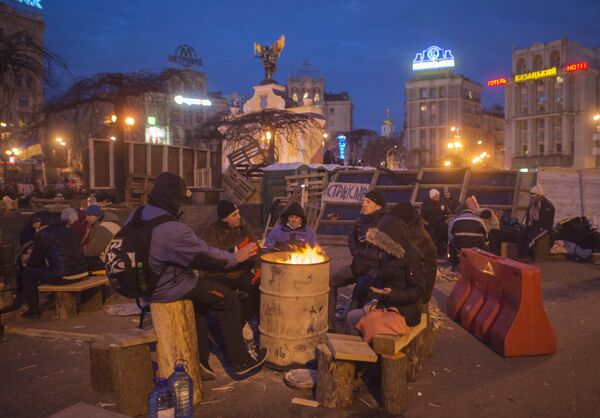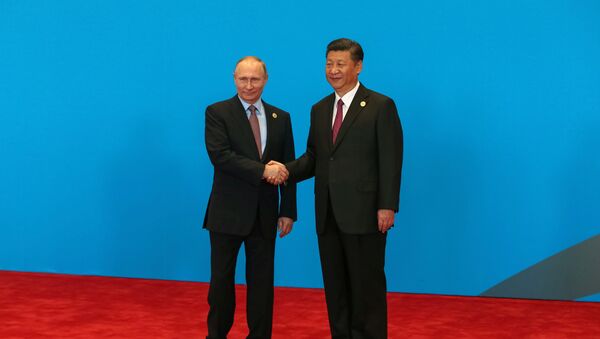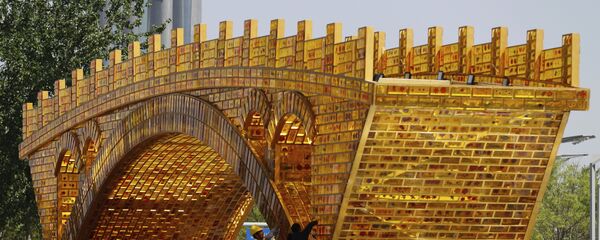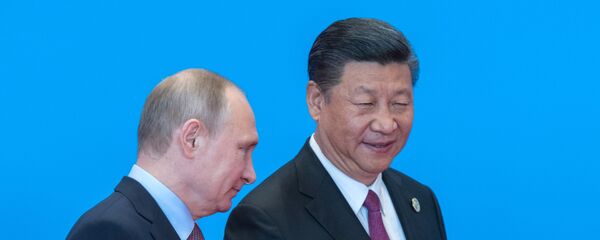The One Belt, One Road Forum for International Cooperation, which took place in Beijing on May 14-15 indicated that both countries are interested in deepening ties and expanding cooperation within the framework of the China-led New Silk Road initiative.
On Monday Russian President Putin underscored that Moscow is ready to actively participate in the implementation of the project.
"All proposed projects correspond to modern development trends, and all these things are extremely necessary and highly demanded. That is why Russia supports the 'One Belt, One Road' project and will actively participate in its implementation together with Chinese partners and, of course, with all other interested states," Putin said.
However, this demonstration of the unity of purpose and intention has prompted a wave of hysteria in the Western mainstream media, Ishchenko remarked.
"In the best traditions of the diplomacy of the 'free world,' [the mainstream media] made an effort to pit Russia and China against one another, predicting a clash of their interests in Central Asia, to which the Chinese expansion allegedly spreads," the political observer wrote.
According to Ishchenko, the US political elite's strategy to curtail Eurasia's development envisaged a three-phase scenario.
The first phase — the so-called Arab Spring — was aimed at destabilizing the Middle East and pushing it into the arms of Islamists.
As a result, "the destruction of North Africa (from Tunisia to Egypt), Syria, and then Turkey would have completely blocked the southern flank of the New Silk Road," he explained.
The second phase envisioned the disruption of trans-Eurasian trade ties between the East and the West. To achieve this goal, the US had instigated the Ukrainian crisis in 2013-2014, the observer believes.

"It was aimed at tying Russia's hands for decades and making it impossible for Moscow to be active in the regions important for the United States, particularly in the Middle East. Secondly, the Ukrainian crisis was supposed to drive a wedge between Europe and Russia and to expel the EU from the big Eurasia project. Without Europe and without guaranteed land transit, the project would have become unprofitable. The Northern Sea Route, which required at least a decade for creating the necessary infrastructure, was not able to provide the demanded volumes of freight alone," he elaborated.
"Thus, Washington's trade, economic and military-political dominance would have been ensured on a long-term basis," Ishchenko emphasized.
However, Russia had managed to upset the US political elite's applecart by not falling into the trap of the Ukrainian crisis and stemming the spiraling Syrian conflict.
"The civil war in Syria is still raging on, but radical Islamists are unable to win it. In Egypt, stability has been restored, and the destabilization of Turkey has also been prevented," the political observer noted.

According to Ishchenko, Russia has become a military-political guarantor of stability at the New Silk Road's southern flank. Moreover, Moscow has begun actively participating in lucrative transit projects, for instance, the Turkish Stream.
"Thus, as a result of Russia's indirect response to the US actions, Moscow has maintained direct and indirect control over the entire Eurasian transit zone, from the Arctic Ocean to the Red Sea and the Persian Gulf," he stressed.
Donald Trump's decision to unilaterally withdraw from the TPP and TTIP initiatives marked the failure of the US elite's plan to disrupt the economic development of the Eurasian continent.
"The US has the last… effective… way to undermine the trans-Eurasian trade and economic project," Ishchenko warned, referring to the fact that the EU remains a crucial part of the project.
He believes that Washington will try to exclude the EU from the Russo-Chinese "association" and redirect Eurasian trade to the US or US-controlled markets.
Although it wouldn't undermine the Russo-Chinese partnership it would make it less profitable and reduce the number of points of convergence between the countries. At the same time, according to the political observer, it would increase the countries interest in the partnership with the US.
"Ultimately, the choice of European politicians will be decisive in the unfolding Russian-Chinese-American race for Europe. If [EU politicians] do not want their countries to repeat the fate of Libya, Syria and Ukraine, they will make the right choice," Ishchenko concluded.






